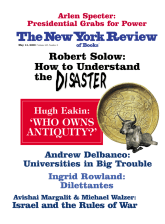In response to:
A Great Dane Goes to the Dogs from the March 26, 2009 issue
To the Editors:
As a lifelong dog fancier and Shakespeare aficionado, I am baffled by Stephen Greenblatt’s assertion that Shakespeare “seems to have disliked dogs” [“A Great Dane Goes to the Dogs,” NYR, March 26]. The quotations he provides as proof are not nearly as convincing as the following two, with which Professor Greenblatt is surely familiar and which seem to contradict his argument:
LORD: Huntsman, I charge thee, tender well my hounds.
Breathe Merriman—the poor cur is embossed—
And couple Clowder with the deep-mouthed brach.
Saw’st thou not, boy, how Silver made it good
At the hedge-corner, in the coldest fault?
I would not lose the dog for twenty pound.FIRST HUNTSMAN: Why, Belman is as good as he, my lord.
He cried upon it at the merest loss,
And twice today picked out the dullest scent.
Trust me, I take him for the better dog.LORD: Thou art a fool. If Echo were as fleet,
I would esteem him worth a dozen such.
But sup them well, and look unto them all.— The Taming of the Shrew, Induction.1.12–24
I’ve heard that kind of dog lovers’ dialogue at American Kennel Club events over and over again. And then there is this magnificent passage:
THESEUS: …We will, fair Queen, up to the mountain’s top,
And mark the musical confusion
Of hounds and echo in conjunction.HIPPOLYTA: I was with Hercules and Cadmus once
When in a wood of Crete they bayed the bear
With hounds of Sparta. Never did I hear
Such gallant chiding; for, besides the groves,
The skies, the fountains, every region near
Seemed all one mutual cry. I never heard
So musical a discord, such sweet thunder.THESEUS: My hounds are bred out of the Spartan kind,
So flewed, so sanded; and their heads are hung
With ears that sweep away the morning dew,
Crook-kneed, and dew-lapped like Thessalian bulls,
Slow in pursuit, but matched in mouth like bells,
Each under each. A cry more tuneable
Was never holla’d to nor cheer’d with horn
In Crete, in Sparta, nor in Thessaly.
Judge when you hear.
—A Midsummer Night’s Dream, IV.1.106–124
Now I ask you, Professor Greenblatt, could these lines have been written by a man who disliked dogs? Wasn’t the poet who depicted hounds “with ears that sweep away the morning dew” a dog lover?
Peter Aczel
Editor and Publisher
The Audio Critic
Quakertown, Pennsylvania
Stephen Greenblatt replies:
The celebrated passages that Mr. Aczel cites demonstrate that Shakespeare deftly grasped the way aristocrats prized their skilled hunting dogs and deemed them worth quite a bit more—“I would not lose the dog for twenty pound”—than the poor peasants who worked their fields.
One could add the passage in which Macbeth, recruiting men to murder his friend Banquo, seems to allude to a catalog—a “valued file”—where the precise qualities of particular breeds were listed and appraised:
Ay, in the catalogue ye go for men,
As hounds and greyhounds, mongrels, spaniels, curs,
Shoughs, water-rugs, and demi-wolves are clept
All by the name of dogs. The valued file
Distinguishes the swift, the slow, the subtle,
The housekeeper, the hunter, every one
According to the gift which bounteous nature
Hath in him closed….
—Macbeth, 3.1.93–100
But, alas, none of these canny observations enlists Shakespeare in the ranks of dog lovers. On the contrary, it is clear from the dozens of dog references in his work that he routinely associated man’s best friend with fawning flatterers, greedily licking up whatever treats anyone offers them, or with snarling, “venom-mouthed” ingrates.
When the crazed Lear tries to convey his sense of the utmost absurdity of existence—a topsy-turvy life in which that which is worthless exercises authority over everyone and everything—he comes up with this simple image: “a dog’s obeyed in office” (King Lear, 4.6.153).
This Issue
May 14, 2009



